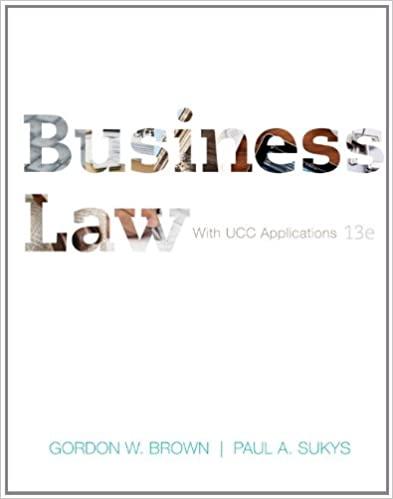One of the most difficult questions that faces anyone who has initiated a lawsuit is whether to
Question:
One of the most difficult questions that faces anyone who has initiated a lawsuit is whether to continue down the rigorous and expensive route of litigation or to take a detour down the road of alternative dispute resolution (ADR). ADR is not the same as negotiation.
Every lawsuit involves some negotiation, no matter how brief or pointless that process might seem at the time. The decision to enter ADR is different. That decision involves taking an uncommon route, the road less traveled as it were. Sometimes ADR is the best path to take and sometimes it does not work. Consider the following case. Two power co-ops, the Cooperative Power Association and the United Power Association, announced their intention to construct high-voltage power lines across Minnesota farmland.
The owners of the farms involved in the plan challenged the project, arguing that the planned route of the lines would destroy their ability to use their own farmland appropriately. The governor of Minnesota called for the creation of a science court to resolve the issue. The science court would be made up of scientists, engineers, and other experts educated in the discipline and the industry involved in the dispute, thus allowing them to use their expertise in deciding the case. The science court would also permit the parties to avoid the long and involved process of litigation. Other ways of solving this problem might be to submit the dispute to mediation or arbitration.
In mediation, the parties to the dispute invite an impartial third party, the mediator, to assist them in solving the problem. In arbitration, the parties invite a third party, the arbitrator, to actually settle the dispute. In the Minnesota Powerline Case any one of these processes might have been used to develop a compromise that would have satisfied everyone involved, at least to some extent. As you read the chapter, ask yourself which of these methods would have been used most effectively in this case. [See Barry Casper and Paul Wellstone, Powerline: The First Battle of America’s Energy War (Amherst: University of Massachusetts Press, 1981); and Barry Casper and Paul Wellstone, “Science Court on Trial in Minnesota,” Science in Context: Readings in the Sociology of Science, ed. Barry Barnes and David Edge (Cambridge, MA: MIT Press, 1982).]
Questions
1. Is this case a civil lawsuit or a criminal action? Explain.
2. Why would the parties want to avoid a trial in this case? Explain.
3. What advantages and disadvantages might arise in the establishment of a science court? Explain.
4. Under what circumstances would mediation be a proper route to take in the settlement of a dispute? Explain.
5. Under what circumstances would arbitration be a proper route to take in the settlement of a dispute? Explain.
Step by Step Answer:

Business Law With UCC Applications
ISBN: 9780073524955
13th Edition
Authors: Gordon Brown, Paul Sukys





